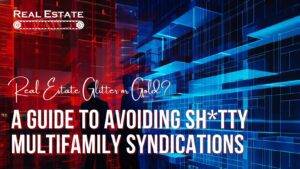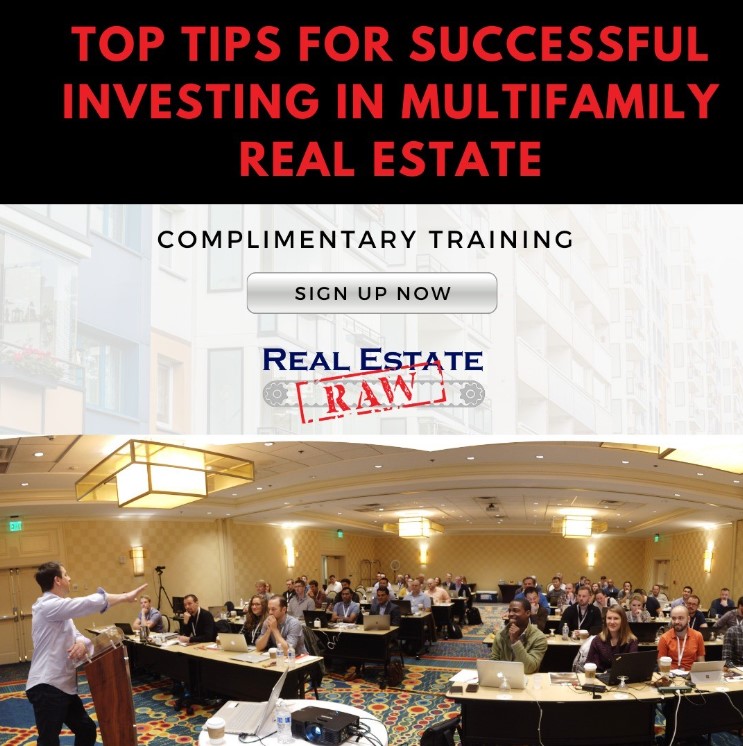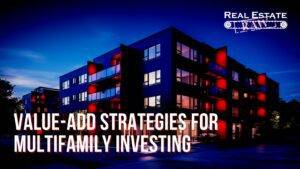Finding multifamily deals through commercial and multifamily realtors can be quite different from working with single-family realtors. The main difference is a lack of a general marketplace. In single-family realty, there is the multiple listing service (MLS). This is where all listings can be marketed to all other realtors representing buyers. In the commercial and multifamily business, there is no MLS. Realtors rarely work together or share information or listings.
This creates a general barrier to entry into the larger commercial real estate market. Realtors are the gatekeepers, and there is no one-stop shop to contact them all. This means that you will need to establish a relationship with a realtor in each of the commercial realty firms in the area to see all the listings in any one city. Here is the system I use to create relationships with new agents:
- Identify all the realty firms that specialize in your asset type in your market.
- Make a list of these companies and their websites.
- Log in and create a profile in their system.
- Sign a few confidentiality agreements.
- Call realtors on current listings.
- Tour the property.
You will need to start with a little research. Look online to see who are the most active realty companies (not agents) that specialize in the asset type you are looking for. This will become your weekly target list. Go to all the companies’ websites and create a profile to ensure that they have your contact information in their system.
Once you are in their database, you will start to receive listings that match the asset criteria you entered on the website (size, price, area, etc.). Now that you are getting what I call in-box leads, go back to the main site, and check out a few current listings. Typically, you will need to sign a digital confidentiality agreement to be able to download the deal details. Once your form is approved, you will be given access to three things necessary to start the deal analysis: the offering memorandum, the rent roll, and the profit and loss (P&L) statement in a month-to-month format.
Note: A P&L statement for a property in a month-to-month format is called a trailing twelve months, or T12 for short.
Now that you have analyzed a few listings, it’s time to reach out to the real estate agent directly. Review as many offering memorandums in the market as possible before contacting the agents. These offering memorandums for other deals will provide you with comparable data for the area in general. This is a great way to research a market. There is no need to do all that market research when the realtor has done it for you and puts it in a property package or offering memorandum.
Getting on the Short List
I have found that larger multifamily and commercial real estate assets are traded through realtors. I always say, good deals don’t stay on the market long, and great deals don’t come to the market at all. Relationships get deals done.
Most commercial real estate agents have a list of buyers who they work with closely. This short list will typically get a first peak at any new properties that the agent may have. If the asset is not picked up by one of those buyers, they will take it out to the general market. This is not always true, of course, but I have found that this typically happens. Your goal is to get on that short list. How?
Education is the 1st answer. When I use the term education, I am not referring to college or high school. I mean real estate education. If you lack experience, there is nothing you can do about that, but if you lack an education, that’s your fault. Read every book, every article, and every bit of information you can get your hands on. Immerse yourself in the subject of real estate.
Tip: Find free trade magazines. There are also free publications, newspapers, blogs, and the like that are written for industry professionals. This is a great way to take your education and vocabulary up a notch. Every industry uses specific lingo and jargon. Free trade publications are a great way to learn to talk the talk. I have not provided a list of publications here because they come and go. Do some online research to determine which ones are currently available and applicable to you. You can also read my two books Creative Cash and Real Estate Raw on Amazon.
An education in this business will lead to experience in this business. If you reach out to realtors and you don’t know what you’re talking about, you are wasting their time, and they will act accordingly. Here are several subjects to be especially aware of when working with realtors.
Know your numbers. What are things selling for in the area? Not knowing the values of the assets that you are targeting is a big tip-off that you are new to the business. Spend some time looking at listings in your target market to get a better understanding of values. The data you are after here is comparable sales prices in the area. Also pay attention to price per unit and price per square foot when learning the values in a market.
Make sure you are familiar with the capitalization rates (cap rates) and debt service coverage ratios (DSCRs) in your market per asset class.
Tip: I highly recommend that you become proficient in deal analysis before you contact real estate agents for the first time. This applies to all asset classes, not just commercial properties.
You must be able to answer this question quickly and professionally. This will likely be the subject of your first conversation with a new agent. How you answer this question will determine how seriously they take you.
Be ready with a short list of answers describing the general terms of what you are looking for. Here is a list of items to discuss:
- Type of asset (house, apartment, storage, etc.)
- Asset classification(A, B, C, D)
- Size (number of units)
- Price range (total price and price per door or per square foot)
- Cap rateexpectations
- Debt service ratio expectations
- Are you willing to buy nonperforming (distressed) assets or properties that need to be fixed up?
Your market research will help you know the current market values and what values to use in this list. The actual data will change with the ups and downs of each economic cycle, but the fundamental metrics are always the same. Knowing this data for your city will showcase your market knowledge and accelerate your relationship building with realtors.
Now that you know what you are looking for, do not lead with this list when first contacting an agent. By calling a realtor and reading them this list, you’re essentially telling them what you would like to buy a perfect asset. This seems logical, but what if the agent does not have that for sale right now? They will take down your name and number, along with your real estate wish list, and be sure to call you…someday. Although you do need to be able to communicate what is a good deal for you, don’t call realtors and just tell them what you would like to buy.
You will get infinitely more traction with an agent by calling them about a listing they already have, not one you wished they had. This is why I created the seven steps mentioned previously. Educate yourself on the market, review a specific deal, then call the realtor. Once you establish a connection, you can bring up the criteria you expect in a good deal but wait until the realtor asks. Always start new realtor relationships by asking about something they have for sale right now.
Tip: Don’t call or email a realtor with a bunch of tire-kicking questions in your first communique. Tell the realtor that you are interested in the asset. Ask about pricing (if the price is unlisted). Ask to tour the asset. Stop. You can ask all the questions you like once you have some face time with the realtor.
When first contacting a realtor and establishing a new relationship, do not try to make a date out of it. What I mean by this is to keep your conversation concise and don’t try to establish a social relationship just yet. Keep it business. Realtors are busy, and they don’t know you yet. The one thing I can assure you that they are interested in is a commission check.
Realtors want to work with people who can close a deal because that is how they make a living. If you try to establish too much of a social relationship early on, it is likely to convey that you really don’t have any money and can’t close a deal, which is why you are chatting them up. Professional buyers don’t have time for all that, and this is one way a realtor will know if you are worth their time or not.
When first contacting a real estate agent, I suggest that you ask about the listing you are calling about. Keep the questions to a minimum and simply try to set up a tour. Be professional and stay away from trying to build too much commonality early on. You can develop the social aspect of the relationship when you meet them in person on the property tour. When on the phone or in email, keep it professional and short. Remember, it’s not a date.
“Tell me about your experience.” “Do you have proof of funds?” “Do you have a portfolio already?”
You may have heard one of these “qualifying” questions if you have ever called a commercial realtor. Getting your first deal can be maddening, but it’s only your first deal once. As you work to become established in this business, your initial interactions with commercial realtors can be challenging. Most will ask some or all these questions in one way or another when you first reach out to them. They want to know that you are worth taking the time to work with.
If you follow the guidelines listed here, you should be questioned less often. No one wants to waste their time, and agents are no different. If it seems like you are just generally shopping for deals, you will not likely get much attention from realtors. If you know your numbers and what you are looking for, then you should get less pushback. If you are confronted with a lack of experience, don’t deny it. If you are new to the business, it would be better for you to admit that and be educated in the market than to try to fake experience. It is also a waste of time to attempt to create a credibility book if you don’t have anything credible to put in it.
If you’re new, just admit it. You won’t be new for long. Fake it until you make it does not work well in this business. It’s too easy to spot a newbie trying to fake it. You think you are gaining credibility, but you are most likely damaging it, and you don’t even know it. Just get your education, know the market, and know your numbers. Someone will give you a shot sooner or later.
Property tours are much more common in commercial and multifamily real estate than in single-family investing. Meeting the agent at the property and doing a tour is one of the best ways to establish a new relationship with a realtor. Therefore, I suggest keeping your communication until then short and direct.
Keep conversations about the property, and don’t ask too many questions early on. Get to the property tour as fast as possible. Once you meet the agent in person, you can allow the conversation to take a more personable route. By trying to establish rapport too quickly, you will seem like you are window-shopping for deals. Just try to get to know the realtor. There is little you can do to turn an agent off faster than to act like you are just fishing for information and not a serious buyer.
Once you have an appointment set, you will most likely meet with the realtor and the property manager. The seller is rarely there for a commercial property tour. A property tour is just what it sounds like—a short tour of the asset. If it’s multifamily, you will go in only a few units, not all of them. It’s a tour, not due diligence. I suggest requesting to see one of each floor plan and a few vacant units. If there are any areas of damage or “down units,” you will want to look at those areas too.
The tour usually lasts thirty minutes or so. This is the time for questions. Ask the realtor any questions you have about the deal itself and ask the property manager any questions about operations and leasing. Here are a few suggestions for property tours:
- If you get to the property early and the realtor is not there yet but the management is, wait to engage the management. Most realtors don’t want you speaking to the property staff without them being present to represent the seller. If you get there before the agent, just step outside and “take a few calls” until they get there.
- Don’t discuss the sale or pricing in front of the management. Wait until you are alone with the agent for that part of the conversation.
- Dress in business casual to full business attire.
- Always ask one question when on a tour: “If money was no issue and you could wave a magic wand to make one thing on this property go away, what would it be?”
- I ask this question of the manager or the maintenance staff (or both). You will be surprised by what they will tell you about the assets.
- You can also ask the question in slightly different ways: “If money was no issue, what repair itemswould you fix?” or even “What upgrade to the property would you like to make?”
I remember touring a large apartment complex with a realtor and the property manager. It was a good location, and it seemed like the buildings were in decent shape. As we walked along the parking lot headed for a vacant unit, I looked over at the manager and quickly asked, “What’s the one thing you would make go away if money was no issue?”
She looked at me with a surprised expression on her face and said, “Only one thing?” That was the start of a lot more questions from me. It turned out that the property had older air-conditioning systems, and because the environmental laws have changed, they were replacing the old systems with new units. The new units cooled much better than the old ones. This sounded like a good thing except that the ductwork was not insulated. This property was in Georgia, where the summers are hot and humid.
The new air-conditioning systems were causing condensation on the uninsulated air ducts, which happened to be in the ceilings of the apartments. The extra-cool ductwork would collect condensation like a cold glass of sweet tea on a hot afternoon. That water would drip on the sheetrock ceiling. Every time this complex replaced a heat and air system, it would collapse the apartment ceiling on the tenants. Then they would move the tenants to a new unit and replace the entire ceiling in the apartment. This was killing the expenses on that asset, and the cash flow was going with it. I learned all that information from one little question.
I suggest that you complete a financial analysis of a property before reaching out to a realtor and touring it. You must be ready to discuss your analysis and your opinions on the deal/numbers with the agent once on the tour.
Study the offering memorandum (OM) before the meeting, have questions ready, and just keep the tour simple. That’s it!
For more information like this check out my blog at www.realestateraw.com and join my Facebook group Real Estate Raw for Multifamily Investors.
Best of luck!
Bill Ham


































